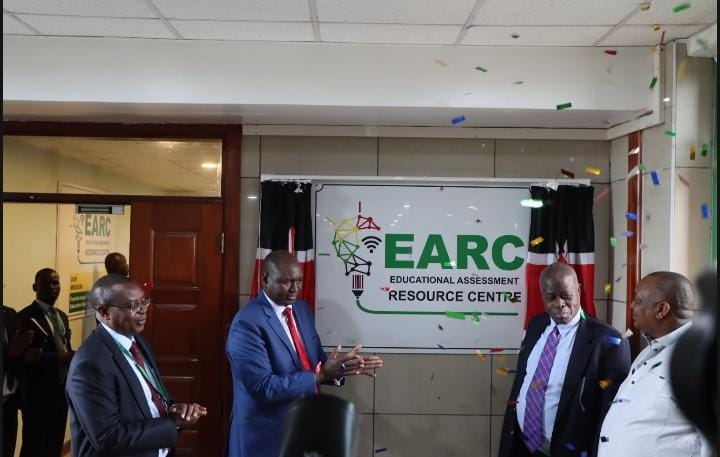Kenya National Examination Council, (KNEC) has taken a significant leap in its education reform journey with the launch of the Education Assessment Resource Centre (EARC), a facility designed to support the country’s transition to Competency-Based Education (CBE). The centre is expected to be a central player in enhancing the quality, equity and inclusivity of learning outcomes nationwide.
The resource centre was officially unveiled in a joint event graced by education leaders including the PS for Basic Education, Prof Julius Bitok, and KNEC CEO Dr. David Njeng’ere. The facility comes at a time when Kenya is preparing for a major system shift, with the first cohort under the Competency-Based Curriculum (CBC) set to join senior school in January 2026.
Prof Bitok described the launch as a visionary step that aligns with Kenya’s long-term educational goals. He said that unlike the now phased out 8-4-4 system, which was heavily examination driven, the new CBE model promotes a more holistic development of learners by focusing on practical skills, values, talents and creativity. “We are no longer just testing what students can remember; we are assessing what they can do,” he noted.
ALSO READ:
Confusion as KUPPET, KNUT jam schools to defend JSS teachers amid arising tensions
KNEC CEO Dr. Njeng’ere emphasized that although access to education has improved significantly across the country, challenges still remain in ensuring that all learners benefit equally from high quality education. The EARC is expected to address this gap by facilitating evidence based policy making, using the council’s extensive historical assessment data, some dating back to 1927. This data will be analyzed to understand trends, successes, and gaps in Kenya’s educational journey.
Beyond being a data hub, the centre is also a capacity building platform, offering digital and in-person training on Competency-Based Assessment (CBA). These programs are already live and are tailored to senior school teachers, school principals, Grade 9 parents preparing for the Grade 10 transition and quality assurance officers. Dr. Njeng’ere encouraged educators to begin accessing these resources immediately, stating that the centre is equipped to serve everyone involved in the learning ecosystem.
To further promote innovation and professional dialogue, the centre will also host weekly assessment conversations every Friday from 3 to 5 p.m., as well as an annual assessment symposium. These platforms provide educators and assessment experts with space to share ideas and strategies that enhance inclusion, equity and learning outcomes. Over the past two years, KNEC has already held successful editions of the symposium, and the weekly conversations are open both in-person and online.
The PS reiterated the centre’s regional importance, highlighting its potential to serve not only Kenyan learners and teachers but also education stakeholders across East Africa. It is positioned to become a hub for assessment innovation and teacher development. The PS also stressed the center’s role in advancing inclusivity, ensuring learners with different strengths, whether in academics, sports, arts or technical fields, are equally supported.
ALSO READ:
Government launches office of Data Protection Commissioner in Nyeri
Another key milestone highlighted during the launch is KNEC’s ongoing digitization of services, starting with the online verification of academic certificates. The first pilot phase will be rolled out with the Public Service Commission, with plans to expand to other public and private institutions.
The successful establishment of the EARC has been made possible through strong partnerships with global agencies. These include the UK Foreign Commonwealth and Development Office (FCDO), British Council, National Foundation for Educational Research (NFER), World Bank and UNICEF. Dr. Njeng’ere confirmed that their financial and technical support was instrumental in designing, conceptualizing and launching the centre, especially considering KNEC’s known budget limitations.
Prof Bitok also assured the public that the Ministry of Education, in collaboration with parliament’s Education Committee, has secured adequate funding to administer the 2025 national assessments: KPSEA for Grade 6, KILEA for Grade 9, and KCSE for Form 4. This move ensures that the transition continues smoothly and credibly.
ALSO READ:
Parent, Private school in legal tussle over withheld transcripts row
The event concluded on an uplifting note with a performance by the Nairobi Girls’ Choir, which Prof Bitok praised as an example of the kind of talent that CBE is designed to nurture. He urged school leaders, educators and parents to embrace the new shift and make full use of the center’s resources. “This is the way forward for Kenya’s education system,” he said. “A shift from rote learning to competency, from exam scores to holistic growth.”
With this launch, the Education Assessment Resource Centre is now positioned as a key driver in the country’s education reforms, empowering stakeholders, utilizing historic data, advancing regional innovation and ensuring that every learner in Kenya counts.
By Benedict Aoya
You can also follow our social media pages on Twitter: Education News KE and Facebook: Education News Newspaper for timely updates.
>>> Click here to stay up-to-date with trending regional stories
>>> Click here to read more informed opinions on the country’s education landscape






